70 - Goodbye to the NHS
Thursday, August 29, 2013
A flying visit to the UK, just a week, mostly to see friends but also to sort the documents I need to begin the process of registering as resident in Spain. Doing battle with British bureaucracy in order to minimise any hassle with Spanish bureaucracy.
So I've been researching residency for some months, and I've learned quite a few things:-
1. I've learned that if you accidentally call it "residencia" on some expat forums, you might as well have invited the entire Spanish Armada to open fire on you. "How could you possibly be so ignorant?" ask the vehemently-correct willy-wavers with too much time on their hands. How could you possibly not have understood that "residencia" as it was, changed a few years ago and is now a matter of signing on the EU Register of Foreign Nationals (in order to declare that you are, well "resident" in Spain)?
2. I've learned that the people in the UK's Overseas Health section are almost all incredibly nice and patient and do their best for you, despite the fact they spend their days talking to people who are moving abroad (usually to somewhere sunnier than the UK).
3. I've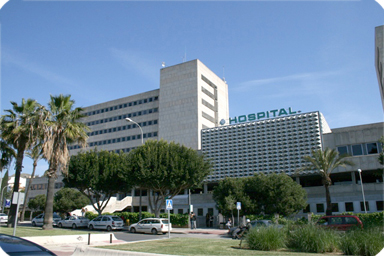 learned that I should ideally have stopped work in December and moved to Spain in January, as this somehow triggers the maximum contribution the NHS makes to the Spanish health system to cover my health care. Then I possibly MIGHT have got two and a bit years of healthcare in Spain paid by the UK government. By retiring at the end of March (which I thought kept things tidy for tax etc) and being unable to be clear about an exact moving date, I have reduced my entitlement to one and a half years. learned that I should ideally have stopped work in December and moved to Spain in January, as this somehow triggers the maximum contribution the NHS makes to the Spanish health system to cover my health care. Then I possibly MIGHT have got two and a bit years of healthcare in Spain paid by the UK government. By retiring at the end of March (which I thought kept things tidy for tax etc) and being unable to be clear about an exact moving date, I have reduced my entitlement to one and a half years.
4. I've learned that I should always check the maths myself. When my final National Insurance bill didn't arrive I rang up as I wanted to pay it promptly, so my contributions would show as up-to-date, in order for me to get the S1 health form to give to the Spanish health system.  The nice lady in the Self-Employed Contributions section worked it out for me, to get me paid up to the end of March when I retired. I did an online transfer straight away, and a week later phoned the Overseas Health section who informed me I still didn't have the full contributions. The nice lady had done it in her head and had missed 10p off. The next day I received a demand from HMRC National Insurance section, sent first class, for the missing 10p. At the bottom of the demand was the standard statement that if I had difficulties paying, I could arrange to pay in instalments. It was tempting ..... ! The nice lady in the Self-Employed Contributions section worked it out for me, to get me paid up to the end of March when I retired. I did an online transfer straight away, and a week later phoned the Overseas Health section who informed me I still didn't have the full contributions. The nice lady had done it in her head and had missed 10p off. The next day I received a demand from HMRC National Insurance section, sent first class, for the missing 10p. At the bottom of the demand was the standard statement that if I had difficulties paying, I could arrange to pay in instalments. It was tempting ..... !
So once I had paid the missing 10p, Overseas Health finally confirmed my 2012/13 contributions were fully paid-up (along with the two preceding years), and yesterday with a deep breath I allowed the nice lady in Newcastle to press the button that would issue my S1. A pause - a moment of fear. It's odd, I have complete faith in Spain's health service, and English and Spanish friends mostly report excellent service. But there's something about having been brought up with the British NHS that makes you feel quite abandoned when it's no longer there for you. This is nothing to do with any misgivings about the Spanish system - it is simply that the mantra "from cradle to grave" is  instilled so deeply within us, and I have many times given thanks to Nye Bevan for creating the NHS in 1948 free at the point of use, for everyone according to their needs. Yet now, once the cogs of the Spanish and British bureaucracies grind their way through the paperwork, the Spanish system will eventually inform the British system that I am registered with them and then ...... and then ..... gulp ..... I will be removed from the caring arms of the NHS. instilled so deeply within us, and I have many times given thanks to Nye Bevan for creating the NHS in 1948 free at the point of use, for everyone according to their needs. Yet now, once the cogs of the Spanish and British bureaucracies grind their way through the paperwork, the Spanish system will eventually inform the British system that I am registered with them and then ...... and then ..... gulp ..... I will be removed from the caring arms of the NHS.
And that feels like the biggest step of all. Tax - fine. Pension - sorted. Signing on the EU Register of Citizens - I'm ready. I already have my NIE number, I'm registered on the Padrón at the ayuntamiento, my bank account seems to work fine, everything is going smoothly. Oh and I speak the language.
But there are a number of assumptions that you hold without knowing it, if the accident of geography and parentage happens to make you British. One is all that stuff about those bits of the world that used to be coloured pink ("Rule Britannia, Britannia rules the waves!"). Another is that the English language will probably see you right pretty much anywhere, even beyond those bits that used to be pink. The third ..... and as it turns out, the only one of these three that I do actually hold dear ..... is that "from cradle to grave" the NHS will take care of us.
 And now, for me, it won't. And now, for me, it won't.
© Tamara Essex 2013
THIS WEEK’S LANGUAGE POINT:
Staying on the health theme, it has always interested me that in Spanish we refer to the parts of our bodies not as MY head or MY fingers, but THE head and THE fingers. So that the English "My head hurts" becomes "Me duele la cabeza" (the head is hurting me). My intercambio partner looked puzzled when I asked why this is, and pointed out that it was unlikely that anyone else's head would be hurting me, so to say "my" head was both unnecessary and (to Spanish ears) rather ego-centric. And this is the main reason for mentioning it here - it's one of the things they laugh at us for! We sound very self-obsessed when we say "Me duele mi cabeza" so it's worth trying to get this one right.
 0
Like
Published at 3:10 PM Comments (19)
0
Like
Published at 3:10 PM Comments (19)
69 - The Many Faces of Feria
Thursday, August 22, 2013
 A city enjoying itself. A heaving, friendly, loud, joyous crowd of humanity, crushed into the city centre then dispersed into plazas, casetas, and random streets where singers sang, dancers danced, drinkers drank, and police looked on benignly. A city enjoying itself. A heaving, friendly, loud, joyous crowd of humanity, crushed into the city centre then dispersed into plazas, casetas, and random streets where singers sang, dancers danced, drinkers drank, and police looked on benignly.
Málaga feria burst into life last Friday night with midnight fireworks over the port. A stranger's baby gurgled in delight and clutched my finger tightly from over its father's shoulder. A concert on Malagueta beach carried the revellers through to the small hours. We wandered back to the car some time after 3am with sand crunching in our sandals.
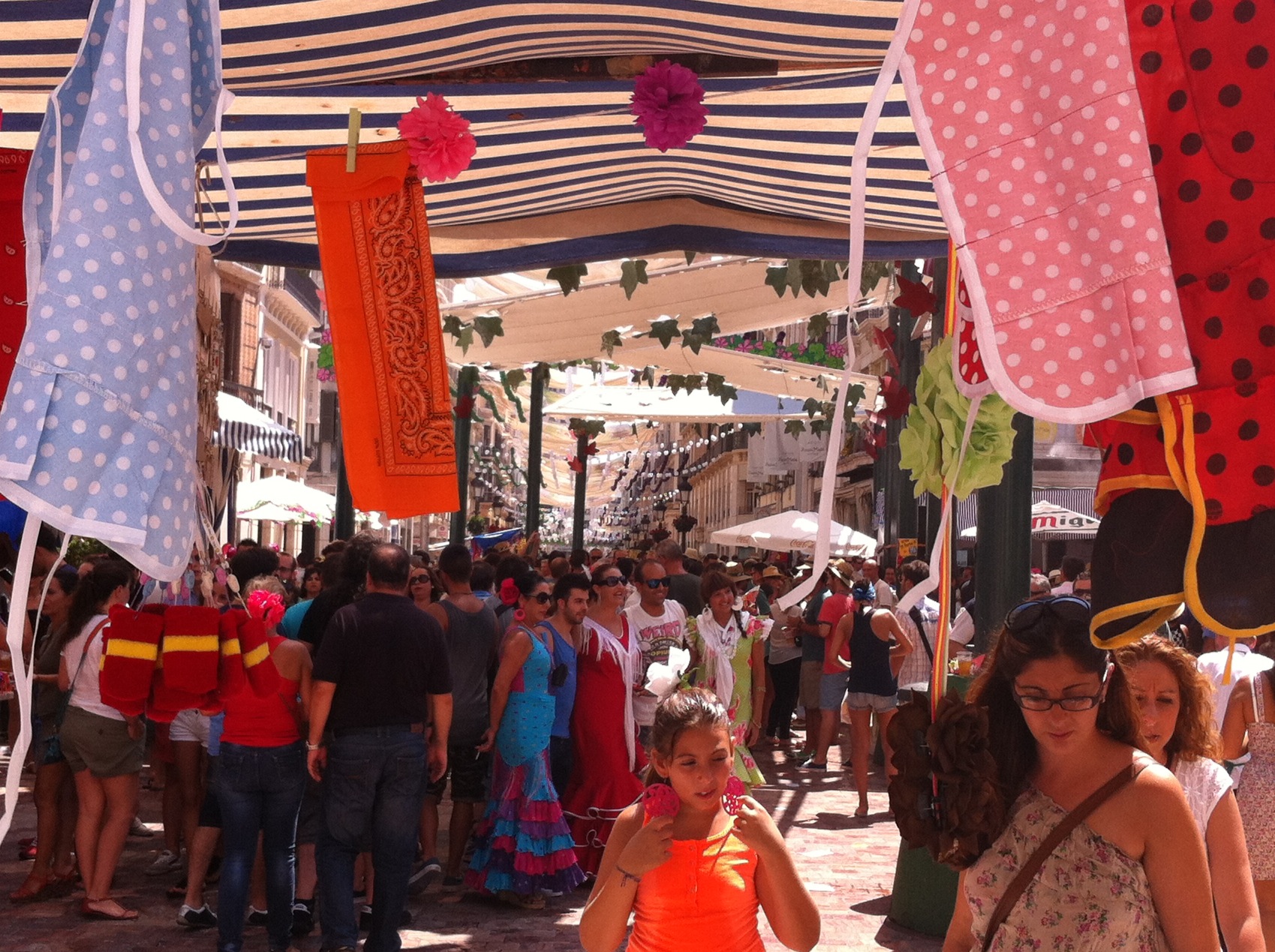 The "day feria" in the city centre is surprisingly unstructured. It seems that if people are simply told "here you are, here is your city, now have a good time" - then they will. Bars had set up outside, casetas had popped up (some in the most unlikely corners - a church porch here, a historic alley there). Disco music blared from big professional systems, and cutting across were live bands wandering the streets, dancers with portable CD players, and the odd supermarket trolley piled high with alcohol and a makeshift loudspeaker. The "day feria" in the city centre is surprisingly unstructured. It seems that if people are simply told "here you are, here is your city, now have a good time" - then they will. Bars had set up outside, casetas had popped up (some in the most unlikely corners - a church porch here, a historic alley there). Disco music blared from big professional systems, and cutting across were live bands wandering the streets, dancers with portable CD players, and the odd supermarket trolley piled high with alcohol and a makeshift loudspeaker.
The day consisted of hanging out in a caseta and dancing (conversation being largely impossible), choosing a 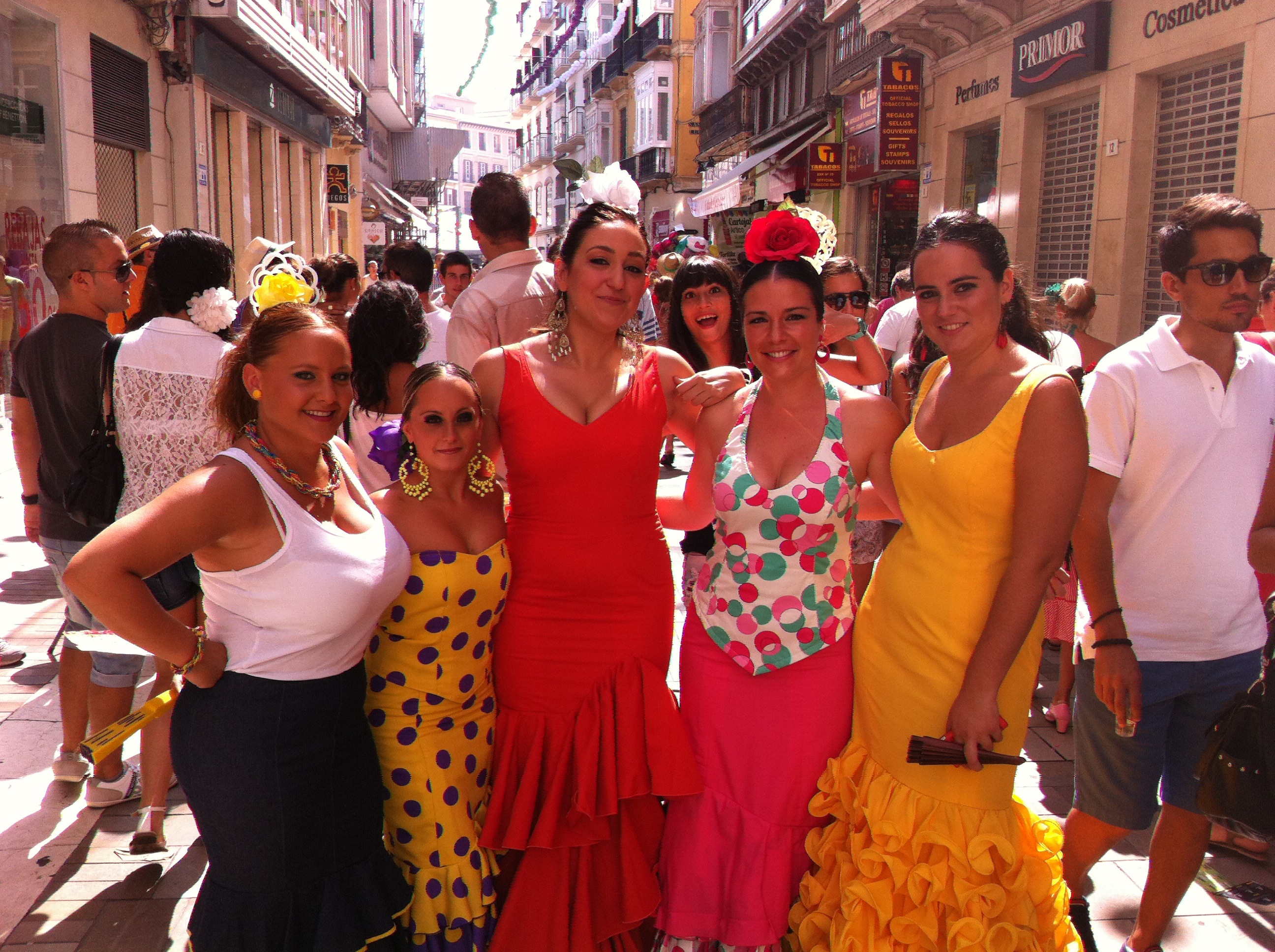 restaurant for people-watching and a leisurely meal of tapas variadas and of course some liquid refreshment. Then on to one of the squares to watch ladies with delicate arms and excessively-frilled dresses demonstrate el arte de flamenco. Home-made entertainment, passing time with friends and family, diving up an alley on a whim, going nowhere in particular. restaurant for people-watching and a leisurely meal of tapas variadas and of course some liquid refreshment. Then on to one of the squares to watch ladies with delicate arms and excessively-frilled dresses demonstrate el arte de flamenco. Home-made entertainment, passing time with friends and family, diving up an alley on a whim, going nowhere in particular.
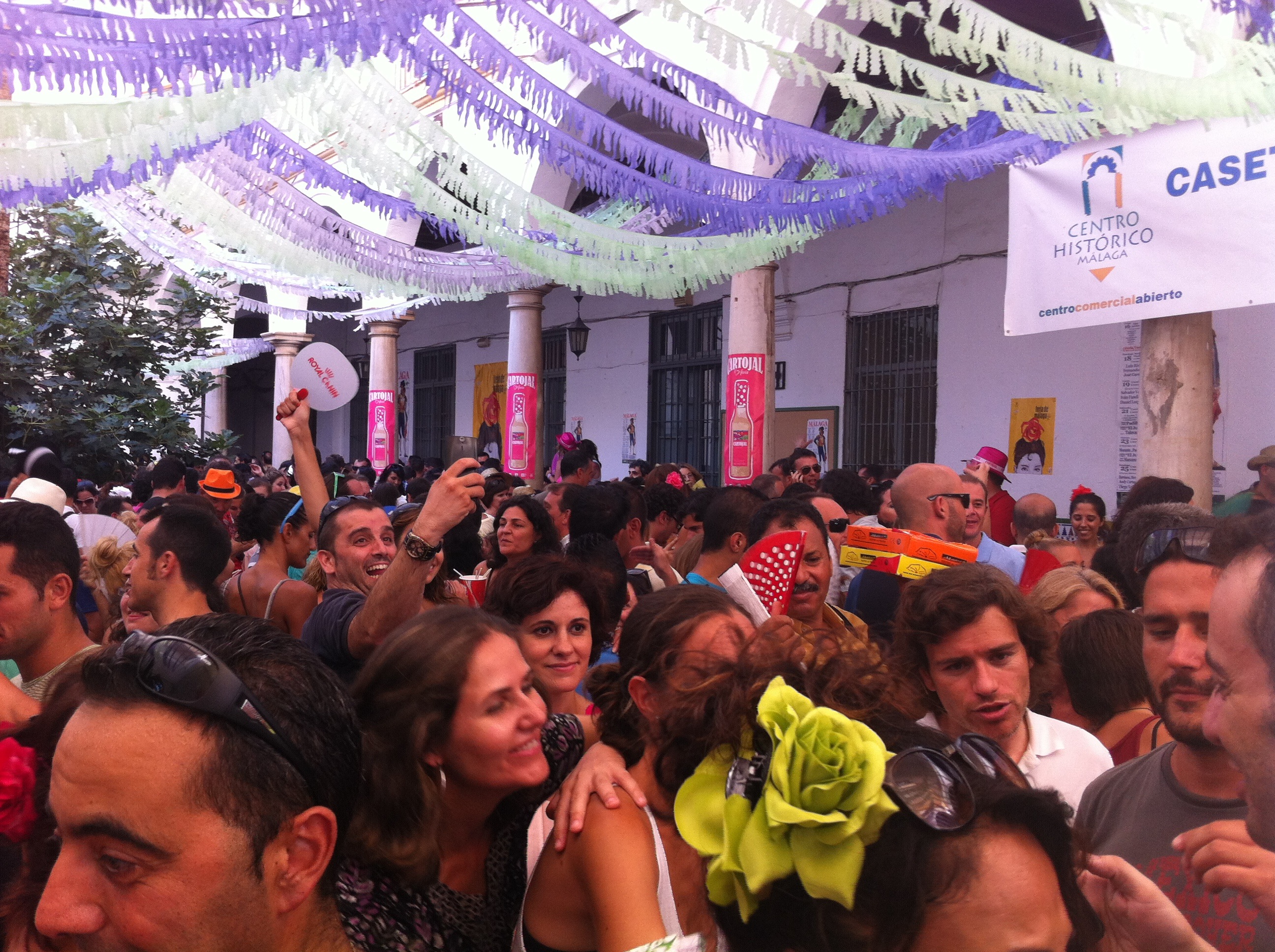 Friends and strangers merged. In La Plaza de Las Flores we four filled a small table. We didn't see it happen, yet suddenly we were six. Two Spanish chicos had taken our picture, then done the same with our cameras, then had become part of our group. We swapped feria experiences, life experiences, friends for an afternoon. Dancing later in a caseta groups wanted to be photographed, wanted to take our photos. A gift of a fan was a timely delight - a moment of generosity with nothing expected in return. Málaga had but one task - to enjoy itself. Any corner, any plaza would do, endless choices, our direction not fixed. Friends and strangers merged. In La Plaza de Las Flores we four filled a small table. We didn't see it happen, yet suddenly we were six. Two Spanish chicos had taken our picture, then done the same with our cameras, then had become part of our group. We swapped feria experiences, life experiences, friends for an afternoon. Dancing later in a caseta groups wanted to be photographed, wanted to take our photos. A gift of a fan was a timely delight - a moment of generosity with nothing expected in return. Málaga had but one task - to enjoy itself. Any corner, any plaza would do, endless choices, our direction not fixed.
 Dead on 7pm the atmosphere changed. Bands packed away their equipment, the noise dropped to just a chattering murmur and the sound of coffee-cups being drained. All of a sudden the cafes and bars were emptying. An army of street-cleaners emerged to restore the beauty of the city, sweeping away a hundred thousand beer glasses and washing down the streets. People formed themselves into two posses - half drifted slowly away, heading home, happy (and maybe just a little drunk), content with their day-feria experience. The other half was more purposeful, some heading for the special buses lined up along Alameda and some heading for the underground car parks. For this group, the evening was just beginning. Dead on 7pm the atmosphere changed. Bands packed away their equipment, the noise dropped to just a chattering murmur and the sound of coffee-cups being drained. All of a sudden the cafes and bars were emptying. An army of street-cleaners emerged to restore the beauty of the city, sweeping away a hundred thousand beer glasses and washing down the streets. People formed themselves into two posses - half drifted slowly away, heading home, happy (and maybe just a little drunk), content with their day-feria experience. The other half was more purposeful, some heading for the special buses lined up along Alameda and some heading for the underground car parks. For this group, the evening was just beginning.
We joined the pilgrims' throng heading out to Feria Real, on an industrial estate on the outskirts of the city, somewhere out towards the airport. The music and the lights guided us, queues of drivers searching for two metres of space to squeeze another car, hordes of pilgrims all heading in the same direction, all heading for the promised land.
 Here, way beyond midnight and on until dawn the task was the same. Malagueños and visitors, all out to enjoy themselves. Children demanded candy floss, and groups of youngsters egged themselves onto the fastest, highest, scariest rides - fuelled with beer they could not turn down the dare. We rode the Ferris Wheel, purportedly the largest in Europe. High above the feria, high above Málaga, high above the world. The casetas were Cuban, Andaluz, Córdoban, Argentine - every type of music and cuisine was there. Crowds milled around between casetas, wandering everywhere and nowhere, following their desires. Here, way beyond midnight and on until dawn the task was the same. Malagueños and visitors, all out to enjoy themselves. Children demanded candy floss, and groups of youngsters egged themselves onto the fastest, highest, scariest rides - fuelled with beer they could not turn down the dare. We rode the Ferris Wheel, purportedly the largest in Europe. High above the feria, high above Málaga, high above the world. The casetas were Cuban, Andaluz, Córdoban, Argentine - every type of music and cuisine was there. Crowds milled around between casetas, wandering everywhere and nowhere, following their desires.
After midnight the music and the dancing cranked up a notch, dominating the rows of casetas, and in the fairground the dares became harder, the young pilgrims had to prove themselves, avoid losing face. The rides seemed faster now, higher and more wild. In between the thrills of the big rides, miniature horses clopped hopelessly in circles, resignedly carrying bouncing 4-year olds on their backs, the horses' heads tied to the poles that keep them spaced, that maintain the gentle speed, that trap them in the never-ending merry-go-round that makes up their miniature circular lives.
 For us that night the feria was over. We had done day-feria and we had done night-feria. We had danced, eaten, laughed, drunk, ridden the Ferris Wheel and snapped feria-iMemories on our phones. The youngsters had completed their dares, achieved their rites of passage, and celebrated with more beer. The children had finally tired, raising wobbly arms to be carried back to cars. 3am and the final choice we had to make was easy - we headed home, already looking forward to another visit, another night. For us that night the feria was over. We had done day-feria and we had done night-feria. We had danced, eaten, laughed, drunk, ridden the Ferris Wheel and snapped feria-iMemories on our phones. The youngsters had completed their dares, achieved their rites of passage, and celebrated with more beer. The children had finally tired, raising wobbly arms to be carried back to cars. 3am and the final choice we had to make was easy - we headed home, already looking forward to another visit, another night.
Back at the Feria Real the casetas were still throbbing to the music, meat was still being thrown onto barbecues, the wheels continued to turn. And the miniature horses clip-clopped onwards, going nowhere, seeing nothing beyond the tail of the horse in front.
© Tamara Essex 2013
THIS WEEK’S LANGUAGE POINT:
Part of my homework before my next lesson is to list some famous titles from English literature, and translate them into Spanish. Of course it was tempting to go for "Jane Eyre", "David Copperfield" and "1984" but I don't think I'd have got away with it. A few I could cheat on, looking in a bookshop for the official Spanish translation. Browsing, I spotted one that didn't seem quite right. "Cincuenta Sombras de Grey" it said (OK I know I'm stretching the word "literature" here). Well I take issue with that as a translation, on at least two counts. The surname HAS to be translated to "Gris" as it HAS to be a colour as well as a person, or the fifty shades don't make sense. And indeed it is important that the colour is grey (gris) because shades of grey is quite evocative, indicating complexity but also a darkness, an absence of colour. But my bigger problem is the use of the word "sombras". Yes, shade, of a kind, or shadows. But the double-meaning inherent in "Fifty Shades of Grey" is lost. It means nuances, variations, inconsistencies ..... it means "shades" in all the myriad meanings of that word! In Spanish, different shades of paint colours are matices, the plural of matiz. But Spanish friends explained that wouldn't work. So maybe the translator is right, perhaps sombras is the best word. But it loses the double-meaning, and leaves me frustrated.
Hmm. This homework is making me think! Any suggestions on how to improve "Fifty Shades of Grey"? Or any other good or bad book-title translations I could use?
 0
Like
Published at 6:52 PM Comments (7)
0
Like
Published at 6:52 PM Comments (7)
68 - Something In The Air
Thursday, August 15, 2013
It’s all around. You can feel it. It’s intangible but you know it’s there. The city, the people, even the buildings, are expectant.
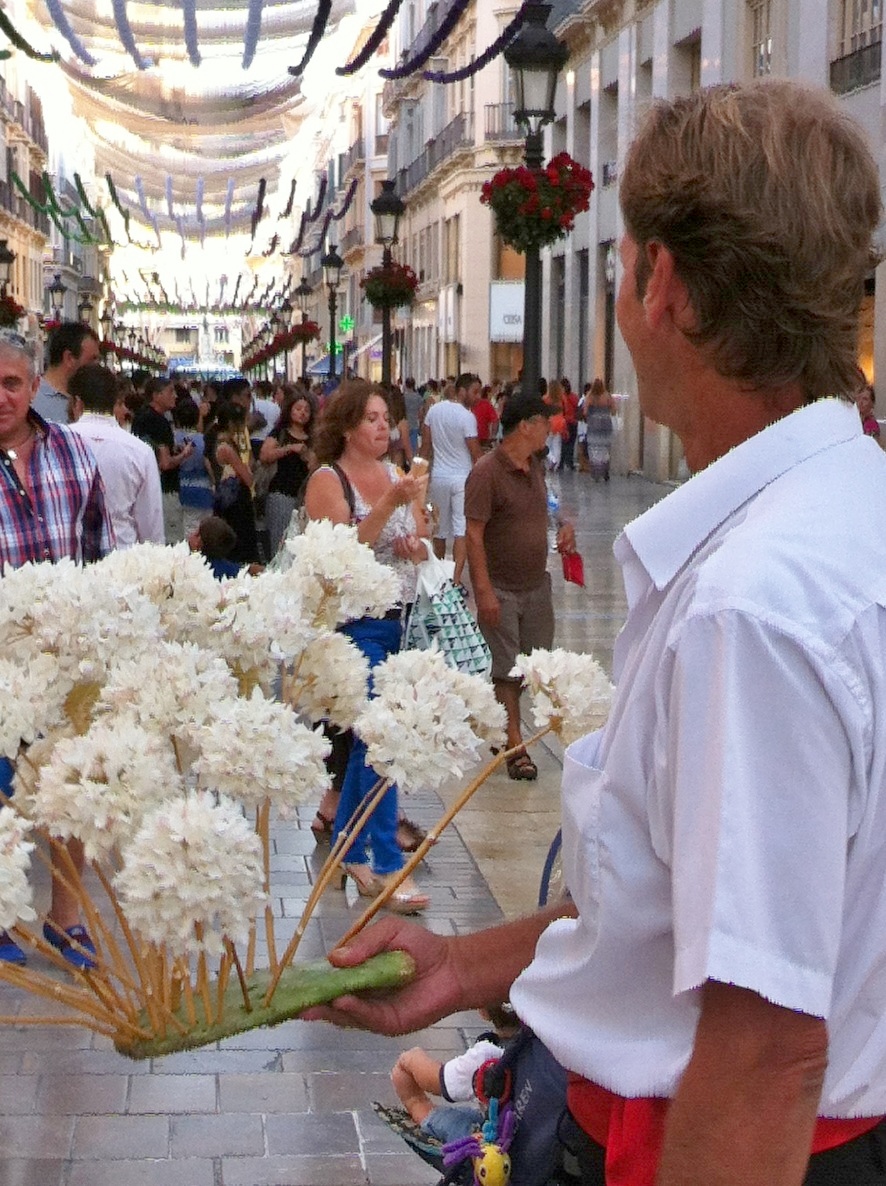 You can smell it. Almost over-powering at times. Jasmine, opening in the evening to release that strong, almost sickly scent. The tiny heads of the flowers, pinned meticulously onto dried thistle-stems to make bigger flower-heads – biznagas – sold by biznagueros in their smart white shirts and red sash belts, a Málagueño tradition. You can smell it. Almost over-powering at times. Jasmine, opening in the evening to release that strong, almost sickly scent. The tiny heads of the flowers, pinned meticulously onto dried thistle-stems to make bigger flower-heads – biznagas – sold by biznagueros in their smart white shirts and red sash belts, a Málagueño tradition.
The biznaga, like the heat, defines the time of year. It is August and the shades float high above Calle Larios to offer respite from the sun. In the evening the shades trap the remains of the heat, encouraging the jasmine flowers to open and fill the street with their smell.
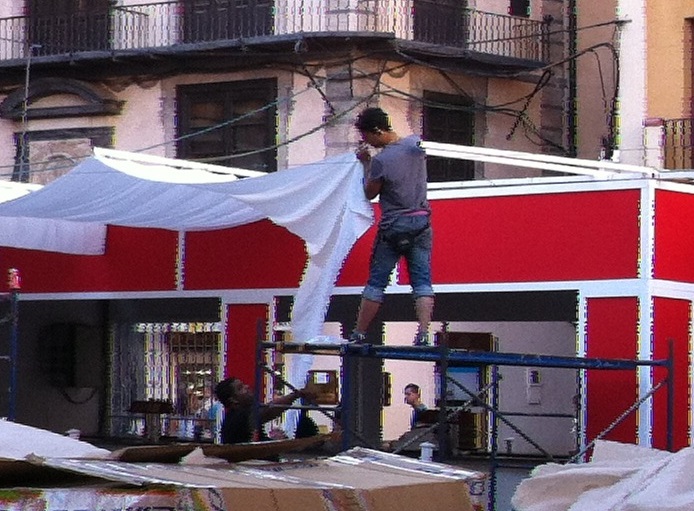 It’s more than just the jasmine. The stage is set …… Málaga is ready. In La Plaza de la Constitución the platform is built. In the side streets stacked barriers await deployment. Lights are strung overhead, loudspeakers are hung from scaffolding. It is almost time. It’s more than just the jasmine. The stage is set …… Málaga is ready. In La Plaza de la Constitución the platform is built. In the side streets stacked barriers await deployment. Lights are strung overhead, loudspeakers are hung from scaffolding. It is almost time.
My feet take me north of La Plaza de la Constitución, into the maze of narrow alleys that contain the bars and restaurants I love. Posters announce the next week’s events. From upstairs windows drift the sounds of final rehearsals. Everything looks ready … sounds ready …. smells ready.
Tomorrow the fireworks proclaim the start. Málaga feria – big, joyous, chaotic, noisy, fast-moving yet bringing the city to a standstill.
The hottest time of year – 40 degree temperatures. But escape to somewhere cooler? No. Málaga de feria. My city is celebrating life, celebrating its very existence. Málaga is ready and so am I.
* * * * * * * * * * * * * * * * * * * * * * * * * * * * * * * * * * * * * * * *
In any case – we’ve had a week’s practice. The village feria was last week, so training has included ensuring time for a siesta, to conserve energy for a string of late nights, long into the madrugada, the small hours.
Colmenar feria is, of course, the best feria in Andalucía. Others may believe their own village puts on the best feria – they are, obviously, wrong.

Fifty lycra-clad cyclists raced up the hill from Riogordo in record time one evening. The next evening the young people raced their home-made cars down the main street trying (and sometimes succeeding) to avoid the hay bales. Children splashed in the foam-filled swimming pool and rolled around in plastic bubbles in the fairground. Horses gathered, men competed to chop wood, beer, porra, paella and embutidos were handed out freely. Neighbours sat with neighbours, late into the night in front of the stage, drinking and dancing. Colmenar de feria – a village partying.
© Tamara Essex 2013
THIS WEEK’S LANGUAGE POINT:
I’m behind with my homework. Fortunately my intercambio meetings continue through August so Jose is my “Profe #1” this month. I got really confused between sitting and feeling. Quite different, but in the “I” form, the same.
Sentir – to feel; Sentar – to sit.
No problem in the second or third person – “Te sientes feliz?” Do you feel happy? “Te sientas allí?” Are you sitting there? “El se siente feliz.” He feels happy. “El se sienta aqui” He is sitting here. Plurals are fine too. No it’s the first person singular (me) that throws the untranslatable cat amongst the proverbial pigeons!
“Me siento aqui?” May I sit here? “Me siento feliz.” I feel happy.
I guess I’ll just have to hope the two meanings don’t coincide in some inconvenient juxtaposition – something about “Could I feel happy sitting here, do you think???”
 0
Like
Published at 1:00 PM Comments (1)
0
Like
Published at 1:00 PM Comments (1)
67 - Can't Be Translated!
Thursday, August 8, 2013
I remember writing a bit of French homework when I was about 12. It was pretty dire, something about falling in a river and being rescued by a boy, and all I recall is that I ended it by writing that "now he is my boyfriend", and simply putting together the French for boy and the French for friend, coming up with the non-existent word "garçon-ami". Wrong! My friend Margaret remembered a similar mis-translation in which she was trying to write about blowing up a balloon, but ended up writing about making it explode. So we know we can't just translate word-for-word.
I'm at the stage where I can do most basic conversation, so am now wanting to speak in the same way I would in English - ie with a bit of colour, personality, and the odd flowery phrase. And that's exactly where the problems arise with the translation! As soon as we begin to use similes and analogies, we hit the buffers (golpeamos los parachoques? I think not!). These phrases or clichés are “frases hechas”, or “made phrases” in Spanish.
Along with Jose, my intercambio partner, I have begun to read a Spanish novel. We are both reading Carlos Ruiz Zafon's "The Shadow of the Wind" or "La Sombra del Viento" - Jose in English, me in Spanish - chapter by chapter.  We discuss each chapter, looking at how the language is used, and how the similes are translated. The first one was a great example of the non-translatability of each other's language. "Bernada affected a ceremonial tone that could not conceal a Cáceres accent thick enough to spread on toast." A good free translation, using an English expression which is immediately clear, and immediately conjures up a visual image AND a sound picture of the maid. We discuss each chapter, looking at how the language is used, and how the similes are translated. The first one was a great example of the non-translatability of each other's language. "Bernada affected a ceremonial tone that could not conceal a Cáceres accent thick enough to spread on toast." A good free translation, using an English expression which is immediately clear, and immediately conjures up a visual image AND a sound picture of the maid.
The Spanish original line however is "La Bernarda afectaba un tono ceremonioso que navegaba con acento cacereño cerrado a cal y canto." So if we were translating word-for-word, we'd have something like "Bernada affected a ceremonial tone that sailed with a Cáceres accent closed, bolted and barred." The last bit “a cal y canto” is a more literary or poetic extension, whereas normally people simply use the phrase “un acento cerrado” for a strong accent.
I’m enjoying reading the novel and discussing these “frases hechas”, it’s a good way to try and add a little colour to the language – though I’m expecting to make some dramatic errors and get some extremely funny looks in the course of spicing up my conversation!
© Tamara Essex 2013
THIS WEEK’S LANGUAGE POINT:
A “made phrase” or “una frase hecha” that it might be safer to avoid – but worth understanding for when you hear it! “Ajo y agua” literally means 'garlic and water' in Spanish, but it is actually a contraction of ”A JOderse Y AGUAntarse”, which can be taken to mean something like this: “You messed up big-time, and now you have to deal with it.” Stronger words may be imagined!
For example:
Rafael: “La engañé a mi novia con otra. Pero ella se enteró y me abandonó.” “I cheated on my girlfriend with another. But she found out and she left me.”
Juan: “Ajo y agua.”
 0
Like
Published at 11:56 AM Comments (7)
0
Like
Published at 11:56 AM Comments (7)
66 - Stalking Writers
Friday, August 2, 2013
A few weeks ago I wrote about stalking Molly and Marianne, the two bloggers who set the agenda for my first year’s forays out around the Axarquía región, the wider Málaga province, and over the border into Granada province. I’m delighted that a few of my readers hopped over to look at these blogs – I’m sure you’ll enjoy what you find there.
And now for the men I’m stalking. So far this has been just virtual stalking. I never miss a word they write, and some of the destinations or regions they describe get added to my Big List of Places to Go. But they are all further afield so they do not have me snapping at their heels and following closely behind them …... yet! Do have a look at one or two of these - the writing is just wonderful.
 Paddy Waller at the Spanish Thyme Traveller runs tours around Valencia, shares my love of local food, and has made me add learning to cook paella properly to my bucket list. http://www.thespanishthymetraveller.com/ and on Twitter @SpainThymTravel Paddy Waller at the Spanish Thyme Traveller runs tours around Valencia, shares my love of local food, and has made me add learning to cook paella properly to my bucket list. http://www.thespanishthymetraveller.com/ and on Twitter @SpainThymTravel
Robin Graham at A Lot of Wind is a superb writer who has kindled my desire to spend more time in the Tarifa /Cadiz area. His writing is thoughtful and beautiful and always reminds me to slow down, take a breath, and enjoy the moment. http://alotofwind.com/ and @RobinJGraham
 Matthew Hirtes whose love of the Canary Islands in general and Gran Canaria in particular has put a visit there right up at the top of my list. He writes professionally for a number of Spain tourism sites so is well worth following on Twitter for tips covering the whole country. http://www.grancanarialocal.com/ and @GranCanariaLocal Matthew Hirtes whose love of the Canary Islands in general and Gran Canaria in particular has put a visit there right up at the top of my list. He writes professionally for a number of Spain tourism sites so is well worth following on Twitter for tips covering the whole country. http://www.grancanarialocal.com/ and @GranCanariaLocal
Simon Harris is the unrivalled expert on all things Barcelona and all things Catalan. Reading him has helped my understanding of the Catalan independence debate. He is the author of the definitive guide to Barcelona (“Going Native in Catalonia”) and also offers guided walks which are a great start to any citybreak. http://www.barcelona-travel-guide.info/ and @simonharris
 Slightly closer by is The Gazpacho Monk. How does one describe Paul? Tai-chi teacher, writer, and in his own words “….. attempting to make some sense of the changing world at my feet and at my finger-tips”, he is brutally honest about the difficulties of understanding this country we have made our home, and delightfully random in the directions he goes and the images he uses in that process. Through podcasts, recipes, photo-compositions, and recordings, the Gazpacho Monk (who has a black belt in gazpacho-tasting!) takes you in unexpected directions and never fails to stimulate. www.insidethetortilla.com/ and @GazpachoMonk Slightly closer by is The Gazpacho Monk. How does one describe Paul? Tai-chi teacher, writer, and in his own words “….. attempting to make some sense of the changing world at my feet and at my finger-tips”, he is brutally honest about the difficulties of understanding this country we have made our home, and delightfully random in the directions he goes and the images he uses in that process. Through podcasts, recipes, photo-compositions, and recordings, the Gazpacho Monk (who has a black belt in gazpacho-tasting!) takes you in unexpected directions and never fails to stimulate. www.insidethetortilla.com/ and @GazpachoMonk
Geography prevents me from stalking these writers very effectively, but I definitely plan to schedule a visit to each of their patches, and then they will find me sticking to them like a limpet just as I have done with Marianne and Molly. Be afraid, guys, be very afraid.
I hope this sample of great blogs and Twitterers about Spain prompts you to visit other parts of this beautiful country (either live, or virtually) and to follow these inspiring writers who can bring a bit of Spain into your life wherever you are.
© Tamara Essex 2013
THIS WEEK’S LANGUAGE POINT:
Along the same lines as my recent problem with “Se me da mal hablar en publico” (I am no good at public-speaking), I am also struggling with “Me cuesta ….” (literally it costs me, but meaning I find it difficult or I struggle with it). “Me cuesta entender este verbo.” (I’m struggling to understand this verb!). “Te cuestan las matemáticas?” Are mathematics hard for you?”
“Me cuesta leer un libro en español, aunque me resulta fácil leerlo en ingles.” “I struggle to read a book in Spanish, although I find it easy to read it in English.” I managed to get the exercise on this that Juan-Mi had set me excruciatingly wrong. Fortunately the language school is closed for August so I have a few weeks to get it right (along with the mountain of homework he has set me).
 0
Like
Published at 11:15 AM Comments (4)
0
Like
Published at 11:15 AM Comments (4)
Spam post or Abuse? Please let us know
|
|